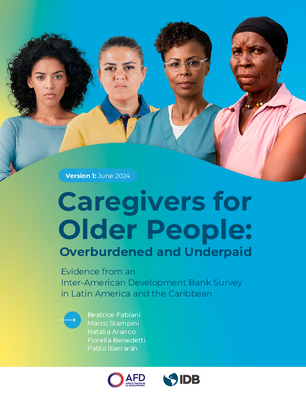Caregivers for Older People: Overburdened and Underpaid: Evidence from an Inter-American Development Bank Survey in Latin America and the Caribbean. Version 1: June 2024
Date
Jul 2024
Human resources are essential to ensure the quality of long-term care. Yet, there are many things we do not know about the wellbeing, the working conditions, and the training of the caregivers for older people. Our work aims to fill some of the existing knowledge gaps by analyzing new data on the conditions of paid and unpaid caregivers in Latin America and the Caribbean.
The new data is generated by a continuous self-administered online survey created by the Inter-American Development Bank, implemented since November 2023 in English, Portuguese, and Spanish in 25 countries. The results highlight the vulnerability of both paid and unpaid caregivers. Paid caregivers typically earn the minimum wage or less. A notable percentage reports episodes of verbal (39%) or physical abuse (14%). Three in ten received no training. Unpaid caregivers are not better off. 31% report feelings of depression and 44% say they had to stop working to provide care for their relatives. Only one in five had any formal training. Given that most long-term carers are women, these results have important implication for gender equality.
The findings underscore the pressing need for policies to develop skills and improve working conditions and wellbeing of caregivers, which is further exacerbated by rapid population aging in the region. By shedding light on these critical issues, this work is relevant for the design and implementation of care policies that improve the wellbeing of both older persons and their caregivers.
The new data is generated by a continuous self-administered online survey created by the Inter-American Development Bank, implemented since November 2023 in English, Portuguese, and Spanish in 25 countries. The results highlight the vulnerability of both paid and unpaid caregivers. Paid caregivers typically earn the minimum wage or less. A notable percentage reports episodes of verbal (39%) or physical abuse (14%). Three in ten received no training. Unpaid caregivers are not better off. 31% report feelings of depression and 44% say they had to stop working to provide care for their relatives. Only one in five had any formal training. Given that most long-term carers are women, these results have important implication for gender equality.
The findings underscore the pressing need for policies to develop skills and improve working conditions and wellbeing of caregivers, which is further exacerbated by rapid population aging in the region. By shedding light on these critical issues, this work is relevant for the design and implementation of care policies that improve the wellbeing of both older persons and their caregivers.
Generative AI enabled





